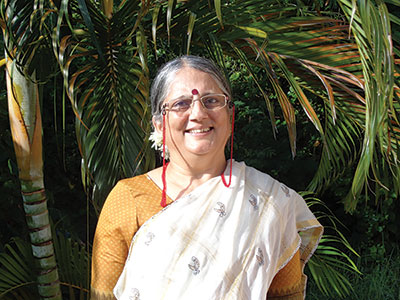A teacher educator and her organisation go to the root of the problem to improve quality of education
The class was getting nowhere. Yes, we played games, enacted plays in the class and did anything that could help make the English language friendly and familiar to children. And yet I knew that at the end of the academic year, a third of the students in class 8 stood no chance of being able to write fluently and correctly in English.
What was wrong? Many of them had come from a background where they were exposed only to the mother tongue and their English language skills were pathetic. I was hoping to get them achieve in three months what they were supposed to have learnt in the past seven years from wherever they had come.
When I focused on the weak ones then I was neglecting those who needed something more challenging and vice versa. What was I to do? This was just one of the problems I had been facing as a new teacher. I had left my career as a journalist to start afresh as a teacher in Peepal Grove School, an alternative school in Andhra Pradesh.
Now this is not about just one problem or about one teacher. Every teacher has a unique problem, and a unique requirement. It may manifest itself in different ways. Another teacher, Ratna, who taught social studies in the same school, was finding it hard to get children in her class to be attentive.
The teacher may have the best education but igniting a desire for knowledge in children needs some thinking. How do you create hunger in students for knowledge, especially of things they are forced to learn as part of their curriculum – say, poetry for instance? And where do teachers go for help?
Well, the answer is: themselves.
Neeraja akka (‘akka’ means ‘elder sister’ in Telugu) came into my life in precisely this context. Neeraja Raghavan is a teacher educator and founder of an organisation called Thinking Teacher which works with schools to help teachers identify their problems and work their way to solutions.
The idea was to de-stress teachers, enhance their efficacy and thus benefit students.
Neeraja began as a researcher in chemistry from IIT Kanpur and went to the Princeton university, but left the field to go back to school as a teacher two decades ago. She joined the Azim Premji Foundation in 2006 to be part of their teachers’ empowerment programme.
And here her insatiable thirst to teach millions of children finally found hope.
“I always dreamt of teaching many children. I felt that if I empowered many teachers then I would indirectly reach out to millions of children,” she says.
The Azim Premji Foundation conducted workshops for teachers but she felt the need to find out how well the teachers coped after that. So Neeraja found some more teaching enthusiasts like herself and started an organisation called Thinking Teacher. That is how she reached my school and the teachers there. A shrink for teachers: that is how most teachers who work with her describe her.
She spends three days at our school every month, watching classes, giving advice and making the ‘patient’ (that is, the teacher) write down his or her key problem and then coaxes him or her to arrive at solutions. Teachers work on their identified problem till it is solved and move on to their next challenge. Thinking Teacher hand-holds a teacher for a year or less till he or she is self-sufficient in dealing with various difficult situations in the classroom related to content or classroom management or anything else.
The strategy is called Action Research, a term well-known in the teacher education sector but hardly exploited as it should be.
Currently, Neeraja’s team is working with four schools around the country including in far-flung Sikkim and her book ‘The Reflective Teacher: Case Studies of Action Research’, to be published by Orient BlackSwan next month, describes these experiences.
Neeraja who was part of the NCERT committee that drafted the new Science syllabus for schools says experienced teachers should come forward to empower other teachers. Her strategy to scale up her work is two pronged: “I hope that my book would inspire other teachers to take up this model of teacher education and replicate it. I also plan to start a course to enable teacher educators to empower teachers through Action Research,” she said.
This, she said, would be different from the BEd courses that are offered as it would be based on each teacher’s experience and hence customised to meet his or her needs.
Excerpts from an interview with Neeraja Raghavan, teacher educator and founder of Thinking Teacher:

What ails teaching?
The main problem is that only a few people opt for teaching out of love for it. That is the crux of the issue. It’s a convenient job for women, fits into a mother’s day. When men become teachers it is often as a last resort.
So how does one ensure that schools get teachers who love teaching?
In a big country like ours it is not easy. What can be done is to enable them to get to like teaching. If you don’t get the job you like then learn to love the job you get. This can be done through in-service teacher development like what we do.
What can schools and government do?
In urban schools and many private schools in rural areas too, the internet is a big resource. Krishnamurti schools used to have CDs of David Attenborough’s Living Planet 20 years ago. I used them to teach Biology to Class VI. But in rural schools if there is electricity there may be one computer which is barely accessible to teachers. So for teachers there, the textbook is the only resource. So the first step would be to motivate teachers to enjoy what they do. Other things will follow.
What is the main problem with the present education system now that there is a new curriculum and the Right to Education Act?
The main flaw is that we think that a year’s BEd will equip a teacher for life. We have superhuman expectations from the teacher. We never ask what she can dip into to be innovative in the classroom. The teacher has seldom been taught to be innovative and we expect the magic to just happen.
The RTE is one step in the right direction. Now the number of students per teacher is down to 30. But for teachers to be innovative and reflective, she needs time. Everywhere I go I find them fire-fighting. You have to free the teacher. There should be unstructured time for her to reflect. Instead of giving her 60 periods a week, reduce it. Give her a free morning or a free afternoon.
How would you describe yourself in this scenario? Some teachers call you their shrink.
I hope I am not a shrink. But I see what you mean. A teacher in a Bengaluru school came to me and said I wait for a month for someone to listen to me. Now teachers thank me for solving their problems. But all I do is listen to them and not provide answers. I encourage them to reflect and document their thoughts. The solution comes from within them in the process.
Did you do this as principal of the schools you worked at?
I had hoped to do this as a principal but ended up doing just administrative work.
Can you explain what is Action Research or AR?
It is no rocket science. It needs just some investment in time. You need to document your process of working your way out of a conflict and slowly it unlocks something in you. It brings to the conscious what was already embedded in the subconscious. It’s a simple framework to identify a problem, work your way to address it, and reflect if it has been addressed.
Tell us something about your book.
The book, ‘The Reflective Teacher’, is a series of case studies in Action Research that I anchored, while working for the Azim Premji Foundation. Several members of the Foundation facilitated teachers of Azim Premji School in conducting AR. It describes the experiences of many teachers and how while addressing little issues related to the classroom or school they were able to identify and resolve deeper issues as well.
A teacher in the Azim Premji Foundation School in Uttarakhand, for instance, recalled how she had focused only on covering her portions for the past 17 years but now realised that it was far more important to focus on how much each child understood and this was [figured out] as she did AR.
Yet another teacher in the same school found through Action Research that his teaching was biased towards the written mode of assessment. He realised that it was a flawed assumption that only those who could write had grasped the matter. It was not that they didn’t know but that they were not confident to express themselves verbally or in writing. So he started giving them options to draw as a way of answering. It made such a huge difference that he altered his assessment methodology.
You went abroad and did your PhD in chemistry. Didn’t you ever feel like going back to your subject?
I studied in IIT Kanpur and later abroad only because of my love for the subject. But teaching was what I always wanted to do. As a teacher I could inspire students. Now as a teacher educator how many more students can I reach? That really excites me.
Menon is a freelance journalist and teaches at Peepal Grove School in Andhra Pradesh.
(The story appears in the October 16-31, 2015 issue)
